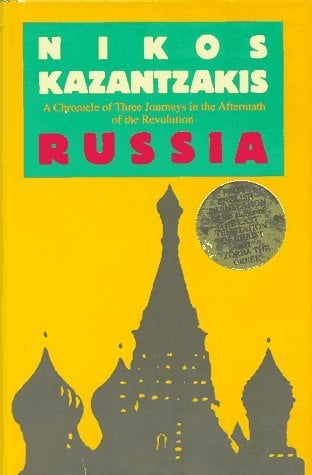Love him or hate him, Nikos Kazantzakis is a force to be reckoned with. Best known in America for Zorba the Greek and—thanks to the Martin Scorcese movie—The Last Temptation of Christ, Kazantzakis wrote what many consider to be the greatest epic poem of the 20th century, The Odyssey: A Modern Sequel. His impact today, 32 years after his death in 1957, remains powerful, despite the relative obscurity of his native language.
Russia derives from three trips that Kazantzakis made from 1925 through 1929. In his mid-40’s at the time, he was simultaneously sympathetic to the Soviet Union and repulsed by it, in a way that was perhaps reflective of his own unresolved tensions in matters of philosophy and art. The sympathy stemmed in part from Kazantzakis’ own attempt to reconcile the religious and mystical tradition of Eastern Orthodoxy with modernity and its children, the Enlightenment and material well-being. Marx and Lenin became figures, as large as Moses and Jesus, who had ushered in “a fanatical, mystically passionate and dogmatic religion: atheism.” Describing the city of Moscow, he says that the “Kremlin rose in front of me: the heart of Moscow, and today, I believe, the heart of the world.”
While it would have been difficult to nominate Calvin Coolidge’s Washington as a contender for the title of “Heart of the World,” more than sixty years later such language seems unnecessarily hyperbolic, to say the least. Still, Kazantzakis saw the world as Pompeii and Russian communism as the first bubbles of lava from a volcano about to erupt and transform that world. He was convinced that the contradictions between spirit and matter, and Christianity and science, would be resolved in a new synthesis that would take into account the Marxist challenge. Because Kazantzakis had a vision of history that was highly critical of consumerism and the capitalist drive to acquire, his Soviet hosts believed that they had in him an intellectual who could be useful to them in their appeal to his confreres in the West. They provided for his creature comforts and travel, and he, wrote for Pravda and the Soviet cinema while in the country. For his part, Kazantzakis felt that his ideas, derived from Henry Bergson and Nietzsche and drawing on Christianity, Buddhism and—of course—the Greek classics, would have something to offer Russian culture when it began to enter its postcommunist phase.
A Soviet prison tour so impressed Kazantzakis that he recounts for several pages the propaganda about rehabilitation through labor and further remarks on the good health of the inmates. When an acquaintance called him to task for his naiveté, Kazantzakis answered in a manner that Machiavelli and Orwell both might ponder: “Only by yearning, deceiving and being deceived—in other words by believing—can man change the face of the earth.”
And yet, Kazantzakis was not really a “political pilgrim.” He did not describe in only “positive” terms the New Soviet Man. His description of the director of the publication Atheist is hardly suitable propaganda, and his vision of Baku, the petroleum capital, pierces through the repetitive chatter of the Soviet guides: “It was raining, a biting cold. We waded in the mud, inside a forest of drilling towers. The air was greasy, the earth vomited oil. Black-green bogs everywhere . . . Here in this contemporary inferno, blackened workers, oiled like rats, struggled to earn their daily bread, smeared by fumes and petroleum.” By the late 1930’s Kazantzakis held the belief that Communism was more exploitative and materialistic than capitalism. He likened it to a forest fire that had to run its course in order to build a new society. Nor did his Soviet hosts ever publish any of his books, or allow them to be sold.
Perhaps the lasting significance of the trips to Russia lies in the thought and experience it provided for Kazantzakis’ masterpiece, the Odyssey. He began drafting it before his Russian tours and devoted himself to it immediately afterwards, completing the work in 1938 at the age of 55. Most of the other fiction for which he has received world acclaim was written after World War II, in a remarkable spurt of creativity that seems to have required, as with Odysseus, a lifetime of soul searching, and many travels.
[Russia: A Chronicle of Three Journeys in the Aftermath of the Revolution, by Nikos Kazantzakis, Translated by Michael Antonakes and Thanasis Maskaleris (Berkeley, CA: Creative Arts Book Co.) 270 pp., $18.95]

Leave a Reply